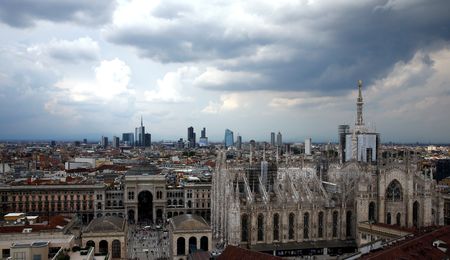By Giuseppe Fonte
ROME (Reuters) -Italian banks and insurers face an 11 billion euro ($12.90 billion) tax increase over three years as part of government budget plans for 2026-2028 that will be unveiled in full on Friday, officials said.
The cabinet is due to meet at 0900 GMT to discuss the budget law to be presented to parliament for approval by year-end.
Rome plans tax cuts and other expansionary measures worth an average of 18 billion euros per year, with the financial sector being called upon to contribute a large share of the funding needs, according to the officials.
The government will collect roughly 4.4 billion euros from the sector in 2026 and more than 11 billion over the three-year period through 2028, a draft budget published on Thursday showed.
The issue has triggered tensions between the government and financial lobbies, as well as divisions within Prime Minister Giorgia Meloni’s rightist coalition.
However, the coalition reached a common stance during a meeting late on Thursday, the co-ruling Forza Italia party said in a statement.
Lenders had set aside 6.2 billion euros in reserves as part of an opt-out clause from a contested 2023 windfall tax. Forza Italia said banks would be allowed to unlock these reserves by paying a 27.5% tax.
If banks distribute these reserves, with a 26% tax rate on dividends, the overall tax take could be roughly 3 billion euros, sources have previously said.
“These will be voluntary choices, without any imposition on banking and insurance institutions,” the party said, adding banks and insurers would also contribute in other ways to state finances.
Other measures being discussed include higher corporate IRAP tax bands and restrictions on the ways financial firms use past losses to lower their tax bills, one official said.
Italy’s banking lobby ABI said earlier this week lenders would agree to support public finances through an extension of a measure imposed by the government last year entailing a multi-year freeze of tax credits, known as deferred tax assets (DTAs), that lenders can tap to boost profits.
The DTA freeze provides short-term liquidity to the government by temporarily boosting tax revenues. The draft budget, however, said Rome was moving to adopt permanent instead of one-off measures.
MF newspaper reported Rome would also hike to 300,000 euros from 200,000 euros a “flat tax” applied on income earned abroad by wealthy individuals who transfer their tax residence to the country.
($1 = 0.8529 euros)
(Reporting by Giuseppe Fonte; Editing by Jamie Freed)











